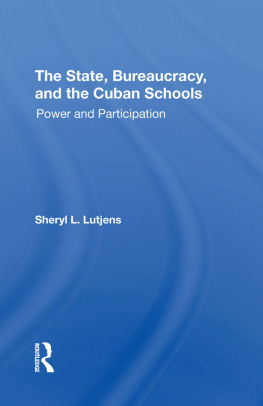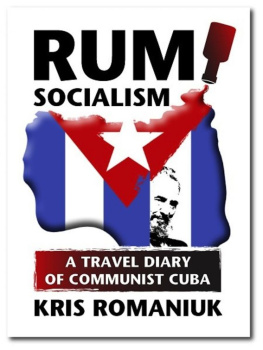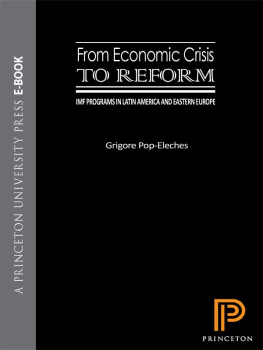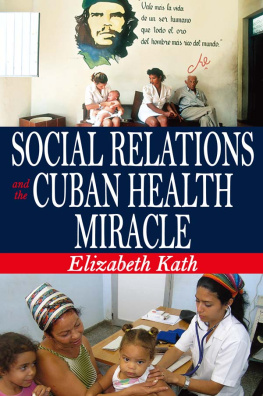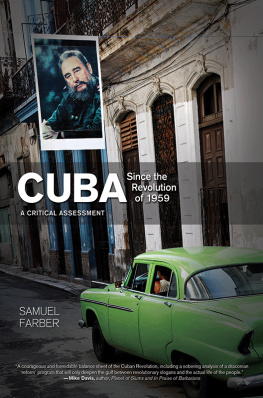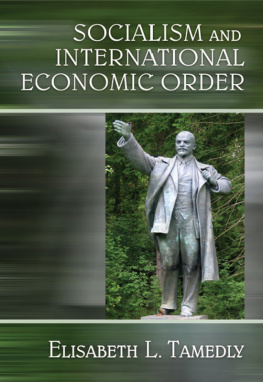The State, Bureaucracy, and the Cuban Schools
Latin American Perspectives Series
Ronald H. Chilcote, Series Editor
The Battle for Guatemala: Rebels, Death Squads, and U.S. Power, Susanne Jonas
The Latin American Left: From the Fall of Allende to Perestroika, edited by Barry Carr and Steve Ellner
In Default: Peasants, the Debt Crisis, and the Agricultural Challenge in Mexico, Marilyn Gates
Fidel! Castro's Political and Social Thought, Sheldon B. Liss
Revolution in the Balance: Law and Society in Contemporary Cuba, Debra Evenson
State and Society in the Dominican Republic, Emelio Betances
Capital, Power, and Inequality in Latin America, edited by Sandor Halebsky and Richard L. Harris
The State, Bureaucracy, and the Cuban Schools: Power and Participation, Sheryl L. Lutjens
The State, Bureaucracy, and the Cuban Schools
Power and Participation
Sheryl L . Lutjens
First published 1996 by Westview Press, Inc.
Published 2019 by Routledge
52 Vanderbilt Avenue, New York, NY 10017
2 Park Square, Milton Park, Abingdon, Oxon OX14 4RN
Routledge is an imprint of the Taylor & Francis Group, an informa business
Copyright 1996 Taylor & Francis
All rights reserved. No part of this book may be reprinted or reproduced or utilised in any form or by any electronic, mechanical, or other means, now known or hereafter invented, including photocopying and recording, or in any information storage or retrieval system, without permission in writing from the publishers.
Notice:
Product or corporate names may be trademarks or registered trademarks, and are used only for identification and explanation without intent to infringe.
Library of Congress Cataloging-in-Publication Data
Lutjens, Sheryl.
The state, bureaucracy, and the Cuban schools : power and participation/Sheryl L. Lutjens.
p. cm. (Latin American perspectives series ; no. 17)
Includes bibliographical references and index.
ISBN 0-8133-8241-6 (alk. paper)
1. Education and stateCuba. 2. Politics and educationCuba. 3. SocialismCuba. 4. Power (Social sciences)Cuba. I. Title. II. Series
LC92.C9L88 1996
379.7291dc20
96-8395
CIP
ISBN 13: 978-0-367-29635-3 (hbk)
This book has its roots in a dissertation completed in late 1987, when rectification was in its early phase. The list of those who have provided support and encouragement for my work since then has grown long over the years; it is a list filled with the names of people and places that have created the meanings in my world, my work, and my wonderings about politics and the future of democracy. It is also a list that crosses academic disciplines and frontiers. I will not write that list here, however, believing that all the people who are in it already know that they are there. Thanks are very much in order, nevertheless.
I would like to express my gratitude to Northern Arizona University for supporting my work in and on Cuba and, especially, that of the College of Social and Behavior Sciences and the Office of Organized Research. I am also grateful for the unflagging advice and encouragement of Ron Chilcote series editor, and also the person who introduced me to the study of politics. I would like to thank Louis A. Perez, Jr., for his long-ago reading of my analysis of colonial historyonly a small part of which is included in this bookand Carlos Alberto Torres for his critical reading of ; responsibility for any problems of fact or interpretation is, of course, mine. Others who read my manuscript at different times for rather similar purposes are acknowledged with both gratitude and respect for the work they have done, including Barbara Metzger; Patricia Heinicke, Assistant Editor at Westview Press; Barbara Ellingtonwho has been a superb editor; and Joe Boles. And my debt is immense to old and new friends and colleagues who have sustained me in a myriad of ways, among them Mary Ann Steger, Susan Deeds, Jennifer Abbassi, Betts Putnam, Joel Edelstein, Teresa Chapa, Larry Preston, and again, Joe Boles.
And, of course, this book would not have been possible without the generous support of Cuban institutions, including the Ministry of Education, the Ministry's Centro de Documentacin e Informacin Pedaggica, and the Instituto Cubano de Amistad con los Pueblos (ICAP) who facilitated the earliest stages of my research. I must once again thank every single educational official, principal, teacher, parent, or student who shared perceptions and understandings with meonce or in repeated interviews. I am equally grateful to Cuban friends and colleagues for sharing their materials, their ideas, and their time with me.
Outside and inside my work on Cuba are my sons and our family (now including Jackson and Sierra); they, like Cuba, have helped me define questions that matter.
Sheryl L. Lutjens
- ANAP Asociacin Nacional de Agricultores Pequeos National Association of Small Farmers
- CDR Comit de Defensa de la Revolucin Committee for the Defense of the Revolution
- FEEM Federacin de Estudiantes de Enseanza Media Federation of Secondary Students
- FEU Federacin de Estudiantes Universitarios Federation of University Students
- FMC Federacin de Mujeres Cubanas Federation of Cuban Women
- INRA Instituto Nacional de Reforma Agraria National Institute of Agrarian Reform
- IPA Instituto Politcnio Agropecuario Agricultural Polytechnic Institute
- IPE Instituto de Perfeccionamiento de Educacin Institute for Educational Improvement
- IPVCE Instituto Preuniversitario Vocacional de Ciencias Exactas Preuniversity Vocational Institutes for the Exact Sciences
- JUCEI Junta de Coordinacin, Ejecucin, e Implementacin Board of Coordination, Execution, and Implementation
- MINED Ministerio de Educacin Ministry of Education
- OPJM Organizacin de Pioneros Jos Mart Jos Mart Pioneers Organization
- PCC Partido Comunista de Cuba Cuban Communist Party
- SNTECD Sindicato Nacional de Trabajadores de la Educacin, las Ciencias, y el Deporte National Union of Workers in Education, Science, and Sports
- UJC Unin de Jvenes Comunistas Union of Communist Youth
We dream of a better socialism, a more perfect socialism.
Fidel Castro, 1994
International attention to Cuban socialism in the 1990s is oddly reminiscent of the spotlight that followed Fidel Castro and the other thirty-something barbudos as they consolidated the 1959 revolution. Much has changed, however, since those early years when an atypical socialist strategy set Cuba apart from Soviet bloc socialism. In contrast to those who in the 1960s speculated enthusiastically about the democratic potential of Cuban socialism, today's enthusiasts are intent on discovering a definitive sign of the end of Castro's rule and the Cuban revolution. In the dramatically different world of the 1990s, Cuba appears once again to be an exception that provokes critical questions. These are not, however, questions about Castro but seldom-asked questions about democracy, socialism, and Cuba's defiant survival.
In the mid-1980s Cuba began a process of reform called rectification (rectificacin) that has differed from the political and economic liberalization that is reshaping the global order. Sustaining an official commitment to socialism in the face of economic crisis and international pressures, Cuba seems exceptional indeed, and the puzzles of rectification will not be solved by importing conclusions about the causes and consequences of change in the East. Though scholarly recuperation from the shocking collapse of the socialist bloc is producing more systematic inspection of why leaders, regimes, and ultimately, ideology came tumbling down, much remains to be explained about the past, present, and future of post-socialist societies and others similarly engaged in the global processes called democratization. The crucial questions about Cuba, as an exception, are precisely the ones that are needed for a better understanding of the dynamics of reform wherever it is found.

